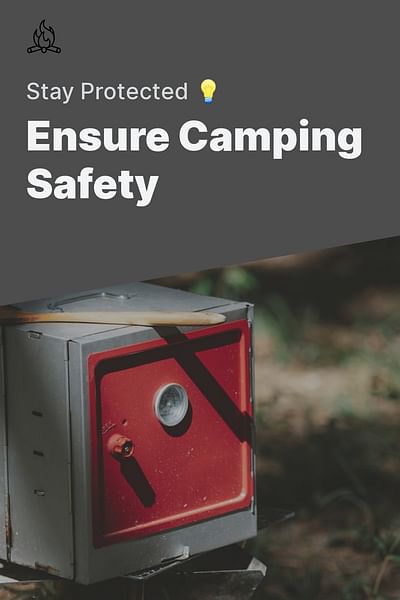Kathryn is a seasoned wildlife biologist with a passion for camping. She possesses extensive knowledge about food storage in territories frequented by bears and loves imparting her practical advice on maintaining safety for both humans and bears. Kathryn is also celebrated for her innovation in weaving wild edibles into camping cuisine.
Keeping your camping tent, site, and food safe is essential for a successful and enjoyable camping trip. Here are some tips to help you ensure the safety of your belongings and minimize any potential risks:
1. Choose a safe campsite: When selecting a campsite, look for designated camping areas that have been approved for use. These areas are often equipped with bear-proof food storage lockers and other safety measures. Avoid camping near bodies of water or areas with dense vegetation, as these can attract wildlife.
2. Store food properly: Storing food correctly is crucial, especially in bear country. Keep all food, including snacks and cooking ingredients, in airtight containers or bear-resistant canisters. Place these containers in a secure location, such as a bear locker or a vehicle trunk. Never store food inside your tent, as the smell can attract animals.
3. Dispose of trash properly: Dispose of all trash in designated bear-proof containers or pack it out with you. Leaving trash out in the open can attract wildlife and create a dangerous situation for both humans and animals.
4. Keep a clean campsite: Maintain a clean campsite by promptly cleaning up any food scraps or spills. This will help prevent wildlife from being attracted to your campsite. Use biodegradable soap and water to wash dishes and utensils away from your sleeping area and dispose of the wastewater properly.
5. Be aware of local wildlife: Research the wildlife in the area you will be camping in and learn about their behavior and habits. This knowledge will help you understand how to safely coexist with the local wildlife and minimize any potential conflicts. For more information, check out our guide on how to store food in bear country.
6. Use bear deterrents: Bear deterrents, such as bear spray or noise-making devices, can be effective in deterring wildlife from approaching your campsite. Familiarize yourself with how to use these tools properly and have them readily accessible.
7. Follow fire safety guidelines: Always follow fire safety guidelines and regulations. Keep your campfire small and manageable, and never leave it unattended. Ensure that your campfire is fully extinguished before leaving your campsite or going to bed.
8. Respect the environment: Leave no trace by packing out all your trash and leaving your campsite as you found it. Respect the natural environment and wildlife by not feeding or approaching them. Remember, we are visitors in their home.
By following these tips, you can help ensure the safety of your camping tent, site, and food. Remember, responsible camping practices not only protect you and your belongings but also help preserve the natural beauty of the outdoors for future generations to enjoy. For more tips on camping food safety, check out our guide on food preservation techniques. Happy camping!















